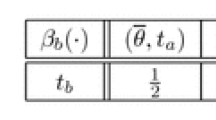Abstract
The present study discusses the relationships between two independently developed models of games with incomplete information, hypergames (Bennett, 1977) and Bayesian games (Harsanyi, 1967). The authors first show that any hypergame can naturally be reformulated in terms of Bayesian games in an unified way. The transformation procedure is called Bayesian representation of hypergame. The authors then prove that some equilibrium concepts defined for hypergames are in a sense equivalent to those for Bayesian games. Furthermore, the authors discuss carefully based on the proposed analysis how each model should be used according to the analyzer’s purpose.
Similar content being viewed by others
References
P. G. Bennett, Toward a theory of hypergames, Omega, 1977, 5: 749–751.
P. G. Bennett, Hypergames: Developing a model of conflict, Futures, 1980, 12(6): 489–507.
T. Inohara, Interperceptional equilibrium as a generalization of nash equilibrium in games with interperception, IEEE Transactions on Systems, Man, and Cybernetics, 2000, 30(6): 625–638.
M. Wang, K. W. Hipel, and N. M. Fraser, Modeling misperceptions in games, Behavioral Science, 1988, 33: 207–223.
M. Wang, K. W. Hipel, and N. M. Fraser, Solution concepts in hypergames, Applied Mathmatics and Computation, 1989, 34(3): 147–171.
P. G. Bennett and M. R. Dando, Complex strategic analysis: A hypergame study of the fall of France, Journal of the Operational Research Society, 1979, 30(1): 23–32.
K. Kijima, An intelligent poly-agent learning model and its application, Information and Systems Engineering, 1996, 2: 47–61.
J. C. Harsanyi, Games with incomplete information played by Bayesian players, Management Science, 1967, 14: 159–182, 320–334, 486–502.
R. D. Luce and H. Raiffa, Games and Decisions, John Wiley and Sons, New York, 1957.
R. J. Aumann, Agreeing to disagree, The Annals of Statistics, 1976, 4(6): 1236–1239.
M. Kaneko, Epistemic logics and their game theoretic applications: Introduction, Economic Theory, 2002, 19: 7–62.
D. Bernheim, Rationalizable strategic behavior, Econometrica, 1984, 52: 1007–1028.
J. Y. Halpern, Characterizing the common prior assumption, Journal of Economic Theory, 2002, 106: 316–355.
S. Morris, The common prior assumption in economic theory, Economics and Philosophy, 1995, 11: 227–253.
R. B. Myerson, Game Theory, Harvard University Press, Cambridge, 1991.
Y. Sasaki and K. Kijima, Preservation of misperceptions-stability analysis of hypergames, Proceedings of the 52nd Annual Metting of the ISSS, 2008.
K. G. Binmore, Rational Decisions, Princeton University Press, New Jersey, 2009.
I. Gilboa, Questions in decision theory, Annual Reviews in Economics, 2010, 2: 1–19.
E. Dekel, B. L. Lipman, and A. Rustichini, Recent developments in modeling unforeseen contingencies, European Economic Review, 1998, 42: 523–542.
Y. Feinberg, Games with Unawareness, Graduate School of Business Discussion Papers, Stanford University, 2010.
J. Li, Information structures with unawareness, Journal of Economic Theory, 2009, 144: 977–993.
Y. Feinberg, Meaningful Talk, A Meeting of the Minds, 2007.
Author information
Authors and Affiliations
Corresponding author
Additional information
This research was supported by Grant-in-Aid for Japan Society for the Promotion of Science (JSPS) Fellows, No. 21-9482.
This paper was recommended for publication by Editor Shouyang WANG.
Rights and permissions
About this article
Cite this article
Sasaki, Y., Kijima, K. Hypergames and bayesian games: A theoretical comparison of the models of games with incomplete information. J Syst Sci Complex 25, 720–735 (2012). https://doi.org/10.1007/s11424-012-1074-5
Received:
Revised:
Published:
Issue Date:
DOI: https://doi.org/10.1007/s11424-012-1074-5




